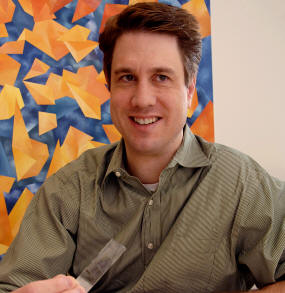Inaugural Biomedical
Research Collaboration Award
Memphis, TN, August
18, 2008 --
The Hartwell Foundation officially
announced the first winners of
a
Biomedical Research
Collaboration Award, which will provide
funding to expand the frontiers of early-stage,
innovative, and cutting-edge applied biomedical research
through special collaboration.
Andrew Pieper, MD,
Ph.D., University of Texas Southwestern Medical
Center and Guoping
Feng, Ph.D., Duke University will receive $260,000
in combined direct cost over three years to pursue their
proposed research for "Rapid Discovery of Small Molecules
for Drug Development in an Animal Model of
Obsessive-Compulsive Disorder."
The Hartwell
Foundation currently funds both researchers
individually, as 2006
Hartwell Investigators. Duke University and the
University of Texas Southwestern Medical Center are both
among The Hartwell Foundation’s
2008 Top Ten Centers of
Biomedical Research.
In groundbreaking
research
funded by The Hartwell Foundation, Dr. Feng has
described
a novel mechanism for the pathogenesis of
obsessive-compulsive disorder (OCD). His
unintentional introduction of OCD into mice was
generated by a unique gene mutation that altered
neuronal transmission, leading to an unprecedented
opportunity to explore effective treatments for the
disorder. Simultaneously, in a separate research project
also funded by the Foundation, Dr. Pieper has
demonstrated
an innovative and facile approach for
screening small drug-like molecules in a mouse model of
schizophrenia, using a unique chemical compound library
located at UT Southwestern.
"The ultimate goal of the proposed collaboration is to
develop more effective treatment for OCD and related
psychiatric disorders that severely affect children. We
propose to combine the expertise and interests of our
two laboratories to conduct an innovative means of rapid
drug discovery that might not otherwise be possible if
we were working alone," said Guoping Feng, Ph.D.
"Unlike
conventional drug screens, which deploy binding or cell
based assays in vitro, our collaborative approach hopes
to identify compounds that are both pharmacologically
active and non-toxic in living animals, quickly
elevating promising candidates for OCD drug development
to a very early stage of discovery," said Andrew Pieper,
MD, Ph.D.
"The combination of expertise and resources by the two
co-investigators at these outstanding institutions
leverage a powerful platform to identify novel drug
candidates, not only for potential treatment of OCD, but
possibly other related psychiatric disorders, as well,"
said Frederick Dombrose,
Ph.D. and President of
The Hartwell Foundation. "Should Pieper and Feng
prove successful in discovering compounds effective for
OCD-like behaviors, it will set the stage for their
further collaboration to seek long-term federal funding
and support from biotech and pharmaceutical companies
for translational research, in the hope of ultimately
developing such compounds into specific medications for
the disorder," he added.
Obsessive-compulsive disorder is
one of the most common and debilitating psychiatric
disorders. It affects 2-3% of the U.S. population, with
approximately half of patients experiencing onset of
their illness during childhood or adolescence. This
devastating disorder is characterized by persistent
intrusive thoughts, repetitive actions and excessive
anxiety. The symptoms of OCD can be unreasonable,
irrational, and significantly compromise personal
functioning. The neurobiological basis of this disorder
is currently not well understood. Tragically, there is a
void of specific and effective treatment options for
patients with OCD, particularly in children. Current
medications for the disorder are often only marginally
effective and frequently associated with substantial and
undesirable side effects. Other poorly understood,
difficult to treat and incapacitating disorders that
share clinical features with OCD, include: transient and
chronic tics (Tourette’s syndrome), compulsive hair
pulling (trichotillomania), obsession with
self-appearance (body dysmorphic disorder), and
hypochondria. Some features of OCD may also be present
in autism spectrum disorders.
|
|
 2006 Hartwell Investigator Andrew Pieper, MD, Ph.D., University of Texas Southwestern Medical Center
2006 Hartwell Investigator Andrew Pieper, MD, Ph.D., University of Texas Southwestern Medical Center
 2006 Hartwell Investigator Guoping Feng, Ph.D., Duke University
2006 Hartwell Investigator Guoping Feng, Ph.D., Duke University
Biomedical Research Collaboration Awards
Individual Biomedical
Research Awards
Top Ten Centers
HOME
|

